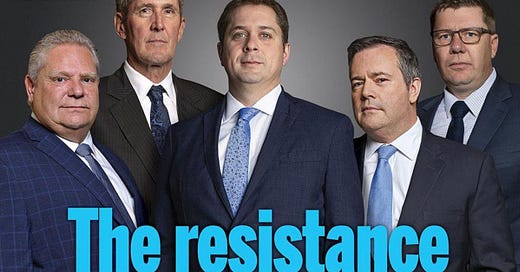Remember that dumb Maclean’s cover?
I wrote the following about it last year in my book, The Trudeau Formula: Seduction and Betrayal in an Age of Discontent, and it’s relevant again now that the right-wing is having a field day attacking Justin Trudeau’s new climate plan:
Back in 2018, the magazine published a feature story about the growing opposition from Conservative leaders to Trudeau’s carbon tax. The cover photo displayed a quintet of white male politicians—Doug Ford, Andrew Scheer, Jason Kenney, Brian Pallister, and Scott Moe—dressed in drab suits, grimacing at the camera. Its headline? “The Resistance.”
It quickly became the butt of jokes on Twitter, with people suggesting alternate headlines. “Harry Rosen sales associates looking at you when you enter the store.” “Siri, show me a box seat at a Steve Miller Band show.” “Diversity is for tie colours.” “The Tragically Unhip.” “The Resistance? More like the First Order!”
But comic relief aside, the story’s framing was a disturbing sign of the nature of the mainstream debate about the climate crisis in Canada. On one side, you had an emerging coalition of right-wingers, led by federal Conservative Leader Andrew Scheer and the premiers of Manitoba, Saskatchewan, Ontario, and New Brunswick, launching political and legal attacks against Trudeau’s carbon price. They spared no inanity in their fear-mongering, accusing it baselessly of killing jobs, raising “the price of everything,” serving as a “cash grab,” and plunging the country into recession. In fact, most people in Canada are receiving more in rebates than they pay out—which is why the Chief Justice of Ontario, while ruling against the Conservative premiers’ court challenge, argued that the carbon price shouldn’t even be described as a “tax.”
And yet, the editors at Macleans were still reinforcing exactly the image these politicians coveted: that of a group of political insurgents defying the establishment, as if they were not part of it themselves.
Meanwhile, the other side of the mainstream debate has been represented by the woefully insufficient policies promoted by the Liberals. But a carbon tax, no matter how large, will not on its own lead to the deep decarbonization of the economy, especially if accompanied by an unyielding commitment to more pipelines and dirty fossil fuel projects.
Which means the range of conceivable options offered Canadians remains drastically narrow: a “yes” or “no” to a feeble carbon tax, Tory- or Liberal-branded pipelines, and a corporate-backed climate plan that would not adequately reduce emissions, or no climate plan at all. It’s a choose-your-own-political-adventure with similarly catastrophic consequences.
Worse still, as that Macleans cover inadvertently underlined, the technocratic policies of the Liberal government make it easy for the right-wing to paint the climate crisis as a concern of elites, and expose even marginally useful measures like the carbon tax to potential political defeat. Carbon taxes are already the least popular climate policy. The overwhelming majority of Canadians, who have not seen increases in their wages or standard of living in decades, are for good reason sensitive to perceived increases in consumer costs—and susceptible to politicians falsely claiming to defend their interests against a Liberal establishment seemingly asking them to shoulder the burden of the climate crisis.
The Doug Ford government in Ontario has used exactly this line of attack. “Supporting a carbon tax may win you brownie points in the faculty lounge or win the praise of jet-setting Hollywood elites, but it is not the only way to fight climate change,” Ford’s spokesperson said in early 2019. “Elite economists may sit in their ivory towers and lecture hard-working families about the need to make everything more expensive, but they will never understand the struggle of counting the pennies and living paycheque to paycheque.”
Any hope of winning ambitious climate action depends on policies that will simultaneously and radically improve our material lives—inspiring and mobilizing a broad constituency who is willing to fight for them, rather than just fear them.
What the narrow debate in Canada has blocked from view is the emergence elsewhere in the world of precisely these types of proposals. None are more important than the Green New Deal, because that framework of policies consciously fuses economic and racial justice with climate action, effectively disarming faux populist right-wing attacks. Unlike the Liberal’s climate plan, it’s easily understandable, clearly identifies enemies to a habitable future, and can build a wide and diverse base of people who have a enormous amount to gain from its implementation. No wonder it’s hugely popular.
But now that the Liberals have tripled down on the carbon tax as their marquee policy, watch for the Conservatives to go to town on it, firing up their base, turning anger about lopsided sacrifices, inequality, and stagnating wages into a battering ram against climate action. It’s why it couldn’t be more urgent for social movements and the New Democrats to vigorously and boldly champion a Green New Deal agenda in Canada—the only way to break open our narrow climate debate and advance solutions that match the scale of the crisis, not to mention build a resistance worthy of the name.





I don't vote for the Green Party but they still own this issue, hands down. How that plays out in the next election in the face of more fires and floods, I haven't a clue.
I wish the Liberals were better...